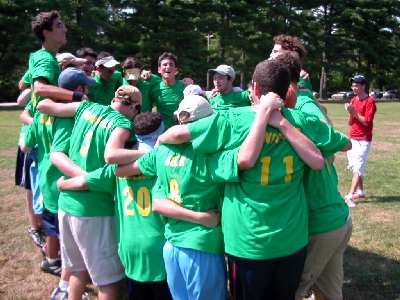Which would you prefer: to spend a night dancing with people who love to sing and celebrate life, followed by a gourmet meal on your own roof porch with good, new friends - or to endure unreflective platitudes of rehearsed religion, followed by an airplane-loud meal of institutional food, punctuated by dick jokes and pushes and shoves from hormonally-charged teenagers?
If you answered (b), you may be, like me, a summer camp addict. Like me, you may spend wonderful New York city weekends with Shakespeare in the Park and Laurie Anderson at Lincoln Center, only to find yourself inexplicably pining for catching kids on raids, faulty laundry machines, and the sort of institutionally mediocre people drawn to the mediocre institution where you, like me, spent your formative years. Your normal friends do not understand. But no matter how wonderful your life is, you still look back fondly, wistfully, nostalgically on the summers when you had to live with twelve other kids, dump your tray after lunch, and learn how to do the breaststroke in a frigid, muck-filled lake.
 Camp people understand this yearning immediately, and non-camp people never will.
Like a mystical experience or a complex work of art, camp's appeal is impossible to
explain to someone who doesn't 'get it.' This inexpressibility points to the
sub-rational appeal of summer camp, the inchoate desire that sticks, like an
affliction or a disease, long after we would reasonably have expected it to
dissipate. I wonder how many parents of current campers really thought through
the $5,000 expense, and how many more were actually impelled by memories of their own younger days, the pain and isolation of adolescence coated by memory with a sort of soft, nostalgic glow. Camps survive on this subconscious avoidance of reason. Ivy-educated counselors, with summer earnings potential in the five digits, settle for a pittance, in order to spend one more year in the place they love. Hippies, hepsters, and intellectuals voluntarily submit themselves to the arbitrary and capricious whims of camp directors, a profession known to self-select for just the sorts of traits that hippies, hepsters, and intellectuals are all supposed to hate. What explains it?
Camp people understand this yearning immediately, and non-camp people never will.
Like a mystical experience or a complex work of art, camp's appeal is impossible to
explain to someone who doesn't 'get it.' This inexpressibility points to the
sub-rational appeal of summer camp, the inchoate desire that sticks, like an
affliction or a disease, long after we would reasonably have expected it to
dissipate. I wonder how many parents of current campers really thought through
the $5,000 expense, and how many more were actually impelled by memories of their own younger days, the pain and isolation of adolescence coated by memory with a sort of soft, nostalgic glow. Camps survive on this subconscious avoidance of reason. Ivy-educated counselors, with summer earnings potential in the five digits, settle for a pittance, in order to spend one more year in the place they love. Hippies, hepsters, and intellectuals voluntarily submit themselves to the arbitrary and capricious whims of camp directors, a profession known to self-select for just the sorts of traits that hippies, hepsters, and intellectuals are all supposed to hate. What explains it?
The temporal gulf of this essay, I think, points to the answer. As I write this, it's mid-August. New York City is enjoying a beautiful week of clear, relatively cool weather, coming on the heels of several oppressive heat waves. People are eating outside. The city is quiet on the weekends, as the rich have fled for the Hamptons or Connecticut.
But you're reading this in September. Do you even remember, just a few weeks after summer's end, what this form of consciousness was like?
|
|



film politics music jay's head poetry art josh ring saddies about archive